Just as they did for Philip Pullman(or, perhaps, Baedeker) in Oxford so for me the streets of Chichester “jostle with the real and the unreal”. In my Chichester the miles of concrete ring roads round the city break up and grass sprouts through, the water meadows have returned. There was no flooding then in 1943; stormy rain poured down the Lavant and spread out in swelling streams to the sea across the flood plain.
 |
|
Sinister ... the gravel pits
|
In 1943 I used to walk by myself along Runcton Lane to the crossroads by the walnut Tree Inn then cross to the road leading past all the nurseries and deep deep gravel pits into Chichester – no frightening roundabout of busy roads and flyovers then. No small 8 year old girl would dare to undertake that journey now
But, after all, 1943 was a different place. Born and bred in South East London, I’d lived from 4 years old with searchlights criss crossing the sky, the ARP man banging on the door and shouting ‘blackout’, ‘blackout’, and collecting huge amounts of shrapnel every morning as we stepped round the overflowing pig bins at every street corner.
Doodlebugs were the real horror, whining across the sky then going silent. We’d look upwards, holding our breath, would it wobble on or take a nose dive? Then one hit my primary school, killed some people, buried the rest of us.
So – no school – instead I found myself at Runcton,
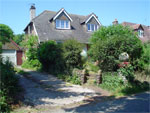 |
|
Uncle's ... my new home
|
7½ years old and my life, proper, began. I’d been buried dugout and gone to heaven. Here I was living with ‘Aunty’ and ‘Uncle’ and their little girl, Peggy who was 2½. Runcton Lane was deep in rural Sussex with water meadows, weeping willows, brambles and cowparsley. Our house was crowded and comfortable in a wild apple orchard with hundreds of chickens everywhere.
On my first day I stayed outside in the orchard all day, eating Worcester pearmains and collecting eggs. That was so magical, searching the long grass and discovering a clutch of warm eggs. No school, either – aunty said, ‘you don’t want to go to school, do you?’ ‘no’ said I – and that was the end of it. The five village boys of about my age were similarly unencumbered
 |
|
Camp ... in the wild bushes
|
by education so I teamed up with them and we all ran gloriously wild. We made a camp in the middle of thick bushes, had an old bed in it, made fires and cooked potatoes and carrots scrumped from someone’s garden.
We swam in the nearby Pagham Rife, quite deep and dreamy, slow moving with maidenhair weed and lots of mud. It’s not like that now – went back to look at it last year. The fields are still there, but tamed and the Rife has dwindled to a shallow flow.
There were plenty of excitements to fill our days. For a start, there were two prisoner-of-war camps very close to my place – one German, one Italian. The prisoners seemed very free, free to work on local farms and the gates in the wire fences rarely locked. We often went into the German camp;
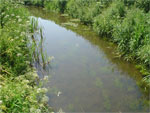 |
|
Swimming ... the Rife
|
the men gave us sweets and showed us photos of their families. I once asked Georg, “Why don’t you escape and run back to Germany?”
He laughed and said, “Why would I? I like it here. If I go back I have to fight”.
Interestingly, by way of a footnote to that – my first school practice at Bishop Otter was at Lancastrian Girls, Orchard Street. The class I was attached to had about 35-40 girls and quite a few of the surnames were German. Apparently, some of the prisoners of war liked Chichester, married village girls and stayed.
Sometimes ‘Uncle’ took Peggy and me in his car round all the empty, twisting lanes delivering eggs and apples to mysterious hamlets, Fisher, Bramber, and we’d receive
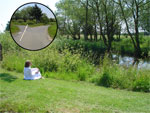 |
|
Drenching ... at the pond
|
gifts in return. Afterwards I would take my old bike and cycle round the lanes, trying to retrace our route. One day I went too fast and fell into a pond at a junction and all the ducks squawked and flew off. I found the pond last month when I went down again and the ducks had come back.
We lived our vivid lives all year long out of doors and the year was always Summer. Sometimes it rained but always a warm rain pelting in puddles and frogs jumping in the lane. The rain refilled the little streams that had been dug on either side of the all the lanes; we could paddle right up to the main road and never come onto dry land. They are still there, carefully tended and with marsh marigolds. Halfway up the lane was the Mill house with a shallow and wide mill stream with watercress.
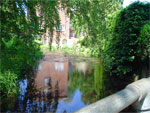 |
|
Paddle ... the Mill House
|
If we were quiet we could paddle in it and not be noticed. Just a little way on from the mill was a house with a big bay window fronting the lane and we could buy ice cream from the window of the living room. The house with the bay window is still there but it doesn’t look as if it sells ice cream now.
And then there were the trees – what stunning trees they were. We could climb them, of course. The boys reckoned I was the best (girl) tree climber they knew. (Before or after, I’ve never had a better accolade) One huge willow was the king – he grew wonkily out of the swamp and went on for ever at an angle. I never, ever reached the top; hidden in the clouds, I now realise it hadripped a hole into a parallel universe as Dr Who could have told me straight away. If we climbed to the top of one particular oak we could see the spire of Chichester Cathedral
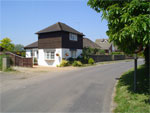 |
|
Ice cream ... the 'shop'
|
across a waving sea of green. They’re all vanished – the Keeper of Trees has taken them to that parallel universe where everything looks like 1943.
The entire area round Runcton was a whole box of delights – there was Siddlesham where uncle owned a brick and coal company. Sometimes Peg and I went with him and there were cats all over the place, waiting to be stroked. North and South Mundham appeared at the end of the lane and fast forward 10 years to 1953, - by an engaging little twist of fate, I found myself sent on our weeks observation at Bishop Otter to North, Mundham school – the school I didn’t attend in 1943. Even then, in 1953, it was still an all age range school, the lastin West Sussex apparently, and could have come straight out of ‘Cider
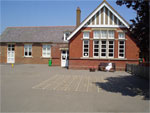 |
|
Back to school ... Mundham
|
with Rosie’. The building looks the same in 2006 but I suspect it’s now very brisk with key stages instead of plump afternoons reading ghost stories and playing in the long grass of the school field.
Then there were the train houses – quite a few of them. Abandoned railway carriages, with all their doors and window intact were scattered in the scrub and woodland around aunty and uncle’s orchard. Various wild looking women and whiskery men lived in them,following mysterious occupations. I was frightened of them; they never smiled and treated children with contempt. For a short while, about a week, I had to sleep in one because aunty had too many visitorsfor me to stay in the house at night. I was terrified – the taciturn man and woman who lived in the train house ignored me and since they locked all the doors, I used to climb out of the window at first
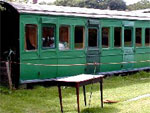 |
|
Scary ... carriage houses
|
light and hang about in the orchard till aunty was up and I could go on. Oddly enough, the train houses vanished from Runcton many years ago but have re appeared down a lane in Mundham, looking rather ancient but covered in roses. We found them 2 years ago on one of our retrospective tours of the area round Runction.
I suppose no one is allowed to stay in Paradise for too long so, snatched back by the stern gods, I returned to South East London and the 11 plus. However, having served my time in the dusty corridors of academe, they relented and allowed me to re-enter the fields of Elysium, this time at Bishop Otter and boy? What fun that was. But that’s another story.
Sadly,
Dot left us in January 2020. Email correspondence can be sent
here